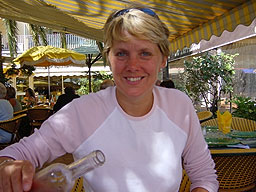Blogging for the People
A colleague at the BBC sent me a fascinating link to a piece about citizen media sites. We're really interested in how this might work in the UK. In fact, here in Scotland, we've dabbled slightly with our Island-Blogging project.
Here's the skinny. Take a handful of islands off the West coast of Scotland where every household has been given a pc and a (narrowband) connection by the local authority. Offer them a way to publish their own blogs via a quick and dirty interface which lets them post texts and images. And stand back and watch both the content and community grow.
And while Clyde Bentley, from University of Missouri School of Journalism, compares community journalism like this to 'little clippings you find on a refrigerator' - which I like as an analogy - the difference for broadcasters like us is that these stories can, sometimes, make it into the mainstream agenda.
My phrase du jour is a 'virtuous content circle'. A story gets driven into a broadcast news context and which, because that exposure gives the material some kind of enhanced validity, drives the viewer/user (I hesitate to use the god-awful 'viewser' word...) BACK to the blog environment.
An example of this was the story about a beached whale on the island of Coll. The fact that a post on one of the blogs from the island made it into one of Radio Scotland's news bulletin prompted this, rather surprised, comment from one of the island-bloggers: "What is best about the project for BBC and bloggers? You [the BBC] are in the news business – you got news about whales from the horse’s mouth so to speak. Perhaps not as elegantly put as a professional writer but it had first hand news…inside views, quotable stuff. This is an ear to a part of the world you [the BBC] seldom visit."
This was a turning point for the success of the project. The bloggers no longer just commented on the news, they were the source for the news.
Here's the skinny. Take a handful of islands off the West coast of Scotland where every household has been given a pc and a (narrowband) connection by the local authority. Offer them a way to publish their own blogs via a quick and dirty interface which lets them post texts and images. And stand back and watch both the content and community grow.
And while Clyde Bentley, from University of Missouri School of Journalism, compares community journalism like this to 'little clippings you find on a refrigerator' - which I like as an analogy - the difference for broadcasters like us is that these stories can, sometimes, make it into the mainstream agenda.
My phrase du jour is a 'virtuous content circle'. A story gets driven into a broadcast news context and which, because that exposure gives the material some kind of enhanced validity, drives the viewer/user (I hesitate to use the god-awful 'viewser' word...) BACK to the blog environment.
An example of this was the story about a beached whale on the island of Coll. The fact that a post on one of the blogs from the island made it into one of Radio Scotland's news bulletin prompted this, rather surprised, comment from one of the island-bloggers: "What is best about the project for BBC and bloggers? You [the BBC] are in the news business – you got news about whales from the horse’s mouth so to speak. Perhaps not as elegantly put as a professional writer but it had first hand news…inside views, quotable stuff. This is an ear to a part of the world you [the BBC] seldom visit."
This was a turning point for the success of the project. The bloggers no longer just commented on the news, they were the source for the news.



